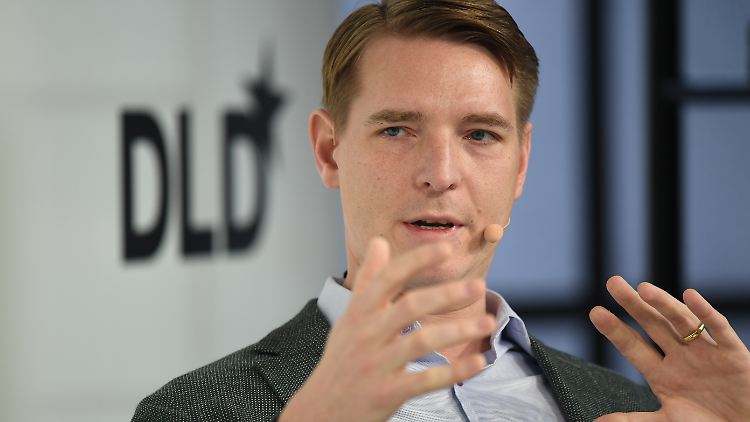Florian Leibert helped build Twitter in the 2010s. In the interview, the 40-year-old analyzes the challenges Elon Musk is facing, why his takeover of the social network was not a mistake despite the turbulence and what opportunities the new competitor Threads has.
Already have a Threads account?
Florian Leibert: Yes, I registered yesterday on the plane on the way to Germany.
What’s your impression?
It’s a very different audience than Twitter, which I use for news and professional networking. On Threads you start with your Instagram contacts, i.e. the more private network. In terms of product, it’s very similar to Twitter. That doesn’t have to be a problem, but there aren’t any surprising features either.
Could it still be dangerous for Twitter?
Florian Leibert became a legend in Silicon Valley in the early 2010s when he got to grips with Twitter’s notorious performance problems as a tech lead.
(Photo: picture alliance /)
I suspect there is already a massive increase in users. And in contrast to all the other Twitter clones like Mastodon and T2, Threads has this starting advantage that you already have contacts via Instagram.
So that network effect, which is probably the most difficult hurdle for a new social network…
Yes. But there is a second challenge, the so-called cold start problem. Before joining Twitter, I worked at Ning, a social network that Marc Andreessen co-founded and was growing faster than Twitter at the time. We had the problem that users registered en masse, but didn’t come back to the site – because there was a lack of relevant content. You could start micro social networks there, like a local group for sailing enthusiasts. You post once and then it quickly goes away again. And if people don’t come back, then you can’t monetize them either. Of course, this could also happen to threads.
How was Twitter in the beginning?
We had the same cold start problem then. It often took up to six months for a user to become an active user. Logged in again and again within a certain period of time.
How did you solve the problem?
There was no simple solution, but we experimented with many different features to increase user engagement – for example, to recommend content and users that are relevant to individual users. For example, we used cookies and Twitter share buttons to read what people visited before logging into websites to learn more about them.
You were responsible for solving some of the biggest infrastructure problems at Twitter at the time…
Twitter at the time was radically different from, say, Facebook, where you could only have a limited number of friends. This also limited the amount of content you could get played out. On Twitter, someone like Justin Bieber could already have ten million followers. And every time he tweeted something, we had to deliver ten million messages on Twitter. Underneath, the system often buckled at the beginning – but we were able to solve it.
One has the impression that Twitter is once again facing profound technical challenges. Or can you make sense of the so-called rate limits – i.e. the decision that you can only access a certain number of tweets?
I don’t know the specific background. It could be that a new feature is actually being tested and seen how user behavior changes as a result. Twitter usage has reportedly gone up lately, so maybe they’re really just not keeping up at the moment. Or it’s about reacting to bots. This is greatly underestimated, what a big problem bots that use Twitter to train their machine learning algorithms are. That’s why there is also the – I think right – strategy that at some point everyone has to verify their account.
So everyone has to pay eight dollars or they’re out? That would drive away tons of users.
It is important to find out whether this is really the case. Otherwise you would have to find another good answer to the question of how to solve the bot problem. Maybe you have to go beyond the said rate limits. I think Twitter needs to experiment a bit with that.
Is the bot problem really Twitter’s biggest problem? Isn’t it the case that Twitter has become a much more uncomfortable place for many users than it used to be, especially in the last few months?
I don’t know if I share this view. For me personally, the content hasn’t changed drastically.
At the end of 2022 you said in an interview that Elon Musk’s entry represented an opportunity for Twitter. Were you wrong?
No, I still believe that. He has ensured that more features are rolled out faster. For example, there are far better ways for users to monetize their content. We had to wait years for this and now it has come within a few months. In general, I find it amazing that the site still works, even though Twitter now has 90 percent fewer employees. That shows what a bloated organization the company was.
Publicly, Twitter gives the impression that total chaos reigns there.
Of course, it looks a bit chaotic at first when 90 percent of the employees have to leave. But we can’t judge that from the outside. And similar things were written about Tesla and SpaceX in the beginning. When there is a leadership change in an agile tech company, there will always be a rumble.
What’s happening on the platform is also chaotic: more extreme content, heated atmosphere, Musk’s constant changes of direction. This is also not a good environment for advertisers…
It’s difficult to build a product that advertisers love because that’s where only mainstream opinion is, and at the same time that users love because that’s where all the views are. But that can be solved, and then advertisers will come back too. The important thing is: Elon’s vision is a political arena in which no opinion or content is censored anymore. And where the content is not clearly steered in a certain political direction, as is the case with Facebook. Don’t get me wrong – Facebook is of course allowed to do this with its product, but I as a user don’t have to use it either.
Are you serious? On Facebook, the content should be politically one-sided?
Yes, there were also corresponding analyses. Liberal content is preferred on Facebook. It used to be different, but then countermeasures were taken and now it has gone to the other extreme. In my opinion, however, users should be given the opportunity to see the content they want, as long as it does not violate any law.
The problem with Musk, however, is that he doesn’t stay out of it completely, but declares his own political views to be the norm. Just a few days ago, he declared the term “cisgender” a swear word and threatened to suspend users who use it.
Of course that’s not the point. He’d better stay out of it.
He has also blocked journalists he doesn’t like. He uses the platform for his personal vendettas.
The case concerned his personal safety, which he felt was at risk because his whereabouts were made public. But it’s true, something like this is not in line with his original announcements. He probably figured it would be easier, too, before he took over Twitter, just how difficult such borderline cases can be. And with such a large platform, you have a lot of borderline cases. And then there is always the question: When does one derive a general rule from this?
Musk doesn’t seem to think too long about something like this, on the contrary, he makes quick and erratic decisions. And everyone can watch.
He’s just a lot less afraid of losing advertisers, for example. And his employees know that if the company threatens to go broke, he will let them go broke. Twitter needs to make money. He will manage that too, he has already made massive cost savings through changes to the infrastructure and cuts in staff.
You think he’ll turn it into a commercial success?
I still believe that. The product has very, very interesting users, there is no comparable platform in the world where you can discuss things face-to-face with stars, politicians or top journalists.
But it’s unrealistic for him to get back his original $40 billion investment, isn’t it?
Did he pay too much money for Twitter? Probably yes. On the other hand, Musk’s other companies also made fun of him in the beginning – today the best-selling electric car is a Tesla. Of course, there’s a chance it won’t work on Twitter. But so far that is not foreseeable. Musk’s investors, which include big names like Larry Ellison, believe in him and that he can build a better product. Such a 180-degree turnaround doesn’t happen overnight either, you first have to build a new culture.
You once said that the eternal problem with Twitter is that it was never really clear what kind of product it should be: a news medium? A communication platform? Is that clearer now?
In my opinion, with the idea of the political arena, a “public square”, there is a much clearer vision of what the product should stand for. And there will be more types of content – just think of Tucker Carlson, who practically launched his new show on Twitter and can monetize it directly without having to get Fox News involved. I find that super exciting.
Of course, that’s also an announcement when the figurehead of the extreme right stands for such a format.
This may be. But people from across the political spectrum will also be able to use the format. Tucker just has a lot of appeal and it was timely because he was just out of Fox.
Niklas Wirminghaus spoke to Florian Leibert
The interview is first at Capital.de appeared

